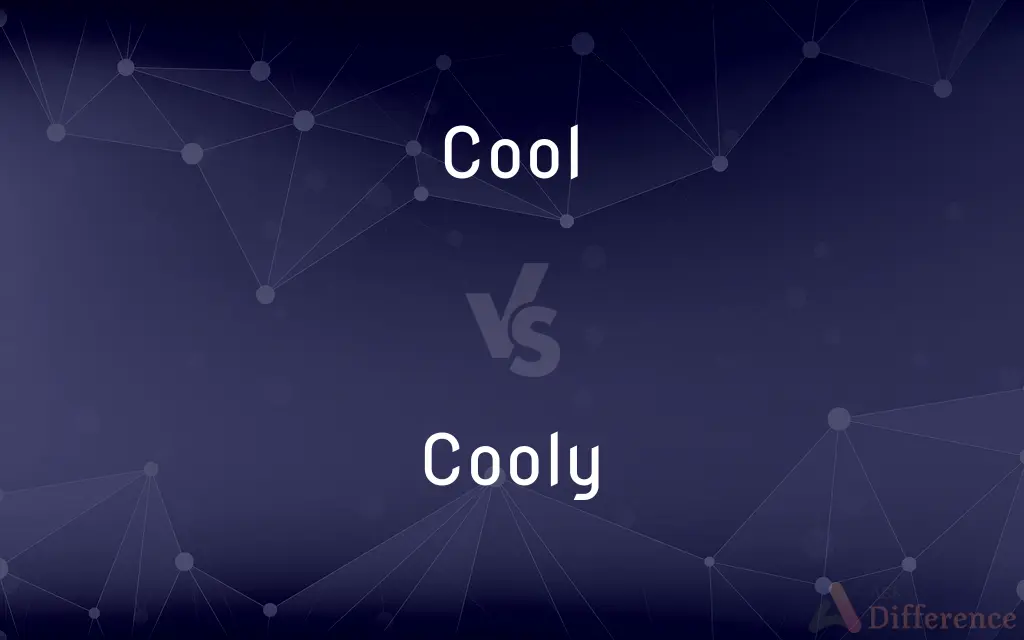Cool vs. Cooly — What's the Difference?
Edited by Tayyaba Rehman — By Maham Liaqat — Updated on April 8, 2024
Cool refers to a moderate or low temperature, often perceived as refreshing, while cooly describes someone's manner as calm and composed, without warmth or enthusiasm.

Difference Between Cool and Cooly
Table of Contents
ADVERTISEMENT
Key Differences
Cool is often used to describe a temperature that is neither too hot nor too cold, providing a sense of refreshment or relief. It can also refer to someone or something that is fashionable, trendy, or impressive in a calm, understated way. On the other hand, cooly (more commonly spelled as "coolly") pertains to the manner in which an action is done - with calmness, composure, and without apparent enthusiasm or warmth. This term is particularly used to describe the demeanor or approach of individuals in various situations, highlighting a deliberate lack of emotion or excitement.
In terms of temperature and physical sensations, "cool" is used to express a pleasant or desired level of chilliness, like a cool breeze on a warm day. Whereas, cooly does not relate to physical sensations but to behavioral characteristics, emphasizing a controlled, detached way of acting or responding.
When discussing social perceptions, cool can denote an admirable quality of being impressive or attractive in a calm, effortless way. Conversely, cooly suggests a possibly negative trait of being too detached or unenthusiastic, which might not always be socially desirable.
Regarding cultural connotations, cool has evolved to encapsulate a wide range of positive attributes, including being fashionable, progressive, or emotionally controlled. Cooly, however, remains narrowly focused on the aspect of emotional restraint and often carries a more neutral or slightly negative implication.
In literature and media, cool is a versatile adjective that can enhance a narrative by adding a layer of intrigue, attractiveness, or desirability to characters and settings. Cooly, in contrast, is typically used to provide a nuanced understanding of a character's behavior, particularly highlighting their composed or unflappable nature.
ADVERTISEMENT
Comparison Chart
Definition
Moderately cold; unfazed, trendy
Behaving in a calm, unemotional way
Usage
Describes temperature, personality, fashion
Describes manner or approach
Connotation
Positive: refreshing, fashionable, admirable
Neutral/negative: detached, unenthusiastic
Related to
Temperature, social status
Behavior, demeanor
Cultural Implication
Associated with being trendy and desirable
Often implies emotional restraint, detachment
Compare with Definitions
Cool
Indicative of calm demeanor.
He has a cool approach to solving problems.
Cooly
In a manner lacking enthusiasm.
He cooly dismissed the idea without much discussion.
Cool
Moderately cold.
The pool water felt cool and refreshing on the hot day.
Cooly
With emotional detachment.
She cooly navigated the awkward conversation.
Cool
Unfazed by pressure.
She remained cool under pressure during the interview.
Cooly
Showing little interest.
He cooly glanced at the menu before ordering.
Cool
Fashionably attractive.
The new tech gadget is really cool and innovative.
Cooly
Behaving indifferently.
She answered the questions cooly, without giving much away.
Cool
Socially adept.
Her cool response made her popular among her peers.
Cooly
Executing actions calmly.
The pilot cooly handled the emergency landing.
Cool
Neither warm nor very cold; moderately cold
Fresh, cool water.
A cool autumn evening.
Cooly
An unskilled Asian laborer.
Cool
Giving or suggesting relief from heat
A cool breeze.
A cool blouse.
Cooly
Alternative spelling of coolie
Cool
Marked by calm self-control
A cool negotiator.
Cooly
Misspelling of coolly
Cool
Marked by indifference, disdain, or dislike; unfriendly or unresponsive
A cool greeting.
Was cool to the idea of higher taxes.
Cooly
An East Indian porter or carrier; a laborer transported from the East Indies, China, or Japan, for service in some other country.
Cool
Of, relating to, or characteristic of colors, such as blue and green, that produce the impression of coolness.
Cooly
An offensive name for an unskilled Asian laborer
Cool
Knowledgeable or aware of the latest trends or developments
Spent all his time trying to be cool.
Cool
Excellent; first-rate
Has a cool sports car.
Had a cool time at the party.
Cool
Acceptable; satisfactory
It's cool if you don't want to talk about it.
Cool
(Slang) Entire; full
Worth a cool million.
Cool
(Informal) In a casual manner; nonchalantly
Play it cool.
Cool
To make less warm.
Cool
To make less ardent, intense, or zealous
Problems that soon cooled my enthusiasm for the project.
Cool
(Physics) To reduce the molecular or kinetic energy of (an object).
Cool
To become less warm
Took a dip to cool off.
Cool
To become calmer
Needed time for tempers to cool.
Cool
A cool place, part, or time
The cool of early morning.
Cool
The state or quality of being cool.
Cool
Composure; poise
"Our release marked a victory. The nation had kept its cool" (Moorhead Kennedy).
Cool
Having a slightly low temperature; mildly or pleasantly cold.
Cool
Allowing or suggesting heat relief.
Linen has made cool and breathable clothing for millennia.
Cool
Of a color, in the range of violet to green.
If you have a reddish complexion, you should mainly wear cool colors.
Cool
Of a person, not showing emotion; calm and in control of oneself.
Cool
Unenthusiastic, lukewarm, skeptical.
His proposals had a cool reception.
Cool
Calmly audacious.
In control as always, he came up with a cool plan.
Cool
Applied facetiously to a sum of money, commonly as if to give emphasis to the largeness of the amount.
Cool
(informal) Of a person, knowing what to do and how to behave; considered popular by others.
Cool
(informal) In fashion and fancy, part of or befitting the most leading trends and habits of the in crowd; originally hipster slang.
Cool
(informal) Of an action, all right; acceptable; that does not present a problem.
Is it cool if I sleep here tonight?
Cool
(informal) Very interesting or exciting.
I think astronomy is really cool.
Cool
(informal) (followed by with) Able to tolerate; to be fine with.
I'm completely cool with my girlfriend leaving me.
Cool
(informal) (of a pair of people) holding no grudge against one another; having no beef.
We're cool, right?
Cool
(sarcastic) (of an act or situation)'' annoying, irritating.
Cool
A moderate or refreshing state of cold; moderate temperature of the air between hot and cold; coolness.
In the cool of the morning
Cool
A calm temperament.
Cool
The property of being cool, popular or in fashion.
Cool
To lose heat, to get colder.
I like to let my tea cool before drinking it so I don't burn my tongue.
Cool
To make cooler, less warm.
Cool
To become less intense, e.g. less amicable or passionate.
Relations cooled between the USA and the USSR after 1980.
Cool
To make less intense, e.g. less amicable or passionate.
Cool
(transitive) To kill.
Cool
Moderately cold; between warm and cold; lacking in warmth; producing or promoting coolness.
Fanned with cool winds.
Cool
Not ardent, warm, fond, or passionate; not hasty; deliberate; exercising self-control; self-possessed; dispassionate; indifferent; as, a cool lover; a cool debater.
For a patriot, too cool.
Cool
Not retaining heat; light; as, a cool dress.
Cool
Manifesting coldness or dislike; chilling; apathetic; as, a cool manner.
Cool
Quietly impudent; negligent of propriety in matters of minor importance, either ignorantly or willfully; presuming and selfish; audacious; as, cool behavior.
Its cool stare of familiarity was intolerable.
Cool
Applied facetiously, in a vague sense, to a sum of money, commonly as if to give emphasis to the largeness of the amount.
He had lost a cool hundred.
Leaving a cool thousand to Mr. Matthew Pocket.
Cool
A moderate state of cold; coolness; - said of the temperature of the air between hot and cold; as, the cool of the day; the cool of the morning or evening.
Cool
To make cool or cold; to reduce the temperature of; as, ice cools water.
Send Lazarus, that he may dip the tip of his finger in water, and cool my tongue.
Cool
To moderate the heat or excitement of; to allay, as passion of any kind; to calm; to moderate.
We have reason to cool our raging motions, our carnal stings, our unbitted lusts.
Cool
To become less hot; to lose heat.
I saw a smith stand with his hammer, thus,the whilst his iron did on the anvil cool.
Cool
To lose the heat of excitement or passion; to become more moderate.
I will not give myself liberty to think, lest I should cool.
Cool
The quality of being cool;
The cool of early morning
Cool
Great coolness and composure under strain;
Keep your cool
Cool
Make cool or cooler;
Chill the food
Cool
Loose heat;
The air cooled considerably after the thunderstorm
Cool
Lose intensity;
His enthusiasm cooled considerably
Cool
Neither warm or very cold; giving relief from heat;
A cool autumn day
A cool room
Cool summer dresses
Cool drinks
A cool breeze
Cool
Marked by calm self-control (especially in trying circumstances); unemotional;
Play it cool
Keep cool
Stayed coolheaded in the crisis
The most nerveless winner in the history of the tournament
Cool
(color) inducing the impression of coolness; used especially of greens and blues and violets;
Cool greens and blues and violets
Cool
Psychologically cool and unenthusiastic; unfriendly or unresponsive or showing dislike;
Relations were cool and polite
A cool reception
Cool to the idea of higher taxes
Cool
Used of a number or sum and meaning without exaggeration or qualification;
A cool million bucks
Cool
Fashionable and attractive at the time; often skilled or socially adept;
He's a cool dude
That's cool
Mary's dress is really cool
It's not cool to arrive at a party too early
Common Curiosities
How do "cool" and "cooly" relate to emotions?
"Cool" can imply emotional control or lack of agitation, while "cooly" suggests deliberate emotional detachment.
What does "cool" mean in a social context?
In a social context, cool refers to being impressive, trendy, or socially adept.
Is "cooly" used in describing physical sensations?
No, it's used to describe behavior or mannerisms, not physical sensations.
Is "cooly" a negative term?
It can be neutral or slightly negative, indicating a lack of warmth or enthusiasm.
How does "cool" influence fashion?
It denotes something fashionable, attractive, or innovative in current trends.
How do "cool" and "cooly" differ in literature?
"Cool" can add intrigue or admiration to characters, while "cooly" often provides a deeper understanding of a character's detached behavior.
Can "cool" describe a personality?
Yes, it can describe someone's calm, composed demeanor or their fashionable, impressive traits.
Can "cool" refer to physical temperature?
Yes, it often describes a moderately cold or pleasantly refreshing temperature.
Does "cooly" have a positive social implication?
Generally, it leans towards neutrality or slight negativity, emphasizing detachment over social desirability.
Can "cool" and "cooly" both describe a reaction to stress?
Yes, but differently: "cool" implies calm under stress, whereas "cooly" suggests an emotionally detached response.
How does one "act cooly"?
Acting cooly involves maintaining composure, showing little emotion, and often detachment in one's actions or responses.
Is "cool" versatile in usage?
Yes, "cool" can describe temperatures, personalities, social status, and more, making it highly versatile.
Does "cool" have a historical context in popular culture?
Absolutely, "cool" has been used historically to describe a wide range of desirable qualities from calmness to trendiness.
Can "cool" imply admiration?
Yes, it can express admiration for someone's demeanor, style, or innovation.
Can "cooly" describe a leadership style?
Yes, it can describe a leader who maintains composure and detachment, though it might not always be seen as a positive trait.
Share Your Discovery

Previous Comparison
Estancia vs. Hacienda
Next Comparison
Paradox vs. PunAuthor Spotlight
Written by
Maham LiaqatEdited by
Tayyaba RehmanTayyaba Rehman is a distinguished writer, currently serving as a primary contributor to askdifference.com. As a researcher in semantics and etymology, Tayyaba's passion for the complexity of languages and their distinctions has found a perfect home on the platform. Tayyaba delves into the intricacies of language, distinguishing between commonly confused words and phrases, thereby providing clarity for readers worldwide.
















































